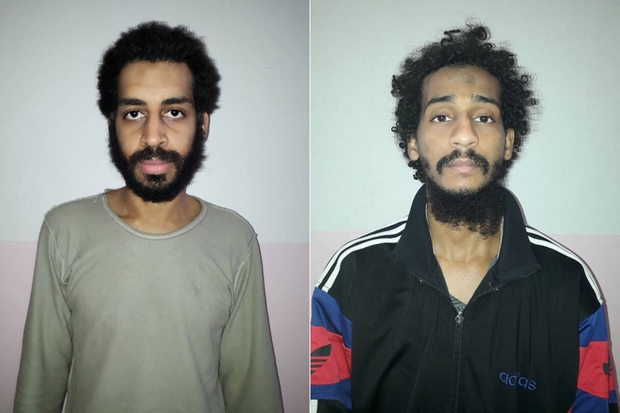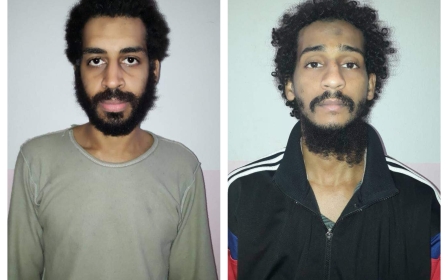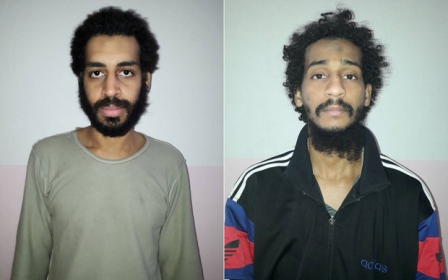US takes custody of two British Islamic State suspects held in Syria

The US military has taken custody of two high-profile British Islamic State (IS) suspects previously held in Syria by Kurdish-led fighters and moved them out of the country.
The move comes amid Turkey's incursion on Wednesday into northeastern Syria where thousands of IS prisoners are being held.
In a tweet, US President Donald Trump said the decision to remove Alexanda Kotey and El Shafee Elsheikh from Syria had been taken "in case the Kurds or Turkey lose control".
The two men were being detained with the goal of putting them on trial in the United States, a senior US official told the Washington Post.
New MEE newsletter: Jerusalem Dispatch
Sign up to get the latest insights and analysis on Israel-Palestine, alongside Turkey Unpacked and other MEE newsletters
The official said the two men, who have been accused of the murder of several Western hostages, had been taken to Iraq.
Earlier on Wednesday, Trump said he had taken a "certain number" of IS fighters out of Syria, as fears mount that Kurdish-led fighters may be unable to keep guarding them amid the Turkish operation.
The Washington Post said around 40 individuals, all considered important IS members, had been taken into US custody.
Four-strong IS cell
In July, the human rights organisation Reprieve warned the UK against providing evidence to the US in the case of Kotey and Elsheikh without receiving assurances that the men would not receive the death penalty.
In evidence given at the UK's Supreme Court, Reprieve warned that failing to receive assurances on the death penalty would set a dangerous precedent.
Kotey and Elsheikh are accused of belonging to a four-strong IS cell dubbed "The Beatles" because of their British accents.
They have been accused of killing several Western captives in Syria, including journalists James Foley and Steven Sotloff and British aid workers David Haines and Alan Henning.
Lawyers for Maha Elgizouli, the mother of Elsheikh, told the UK Supreme Court that they had been informed by prosecution chiefs that - contrary to what they previously thought - there was enough evidence for Elsheikh and Kotey to be tried in Britain.
Their arrest last year provoked controversy about whether the two should be tried in the UK or abroad - a controversy further compounded when it was revealed that then British Home Secretary Sajid Javid said he would share evidence with US authorities without receiving reassurance that the men would not receive the death penalty.
Leaked letter
A letter leaked to UK media in July 2018 revealed that Javid told then US Attorney General Jeff Sessions that Britain had "strong reasons for not requiring a death penalty assurance in this specific case".
Speaking in the UK Supreme Court, a lawyer for Elgizouli argued that the decision by Javid - which they were challenging - would undermine the UK's previously stated policy of opposing the death penalty.
Why is Turkey invading northeast Syria?
+ Show - HideWho is fighting who?
Democratic Union Party (PYD)/Peoples Protection Units (YPG)
Founded in 2003, the PYD and its military wing the YPG are the ideological sister group of the Kurdistan Workers Party (PKK), which has fought a decades-long conflict with Turkey.
Following the beginning of the Syrian civil war in 2011, the PYD managed to take control of much of the Syria's north in the security vacuum that followed.
The group claims to espouse an ideology called "democratic confederalism", based on the ideology of PKK founder and leader Abdullah Ocalan, who has been in prison in Turkey since 1999.
Turkey
Turkey has long viewed the growth of the PYD with deep concern, and a peace process between Turkey and the PKK collapsed in 2015 in part over the spread of the Syrian Kurds' influence.
Since then, Erdogan has repeated his determination that he would "never allow the establishment of a Kurdish state in northern Syria".
What does Turkey want in northern Syria?
Turkey fears that a pro-PKK entity on its southern border would inevitably become a launchpad for attacks on Turkey.
In addition, Turkey wants to expell Syrian refugees from Turkey and resettle them in a "safe zone" it plans to create in northern Syria.
Turkey has the largest refugee population in the world, and the presence of Syrians in the country has increasingly led to animosity from Turks who blame them for crime, unemployment and the dilution of Turkish culture.
What does the PYD want in northern Syria?
The PYD's long-stated aim has been the creation of a statelet on the basis of Ocalan's ideology, as well as protecting Kurdish rights.
The area controlled by the PYD, known as Rojava, has established autonomy with networks of local councils and forums that aim to promote decentralised democracy - though the group has been accused of enforcing a one-party rule in the region.
What does the US-led coalition want?
Donald Trump was elected on a platform of isolationism and has touted the defeat of IS as the sole reason for US involvement in Syria - now that has largely taken place, Trump has argued the United States has no need to remain.
The biggest fear for the US and its allies is that Turkey's takeover of PYD-controlled areas could see the release of some of the 15,000 IS fighters previously captured by the Kurds and their allies.
What does the Syrian government (and its allies) want?
The Syrian government, as well as its close allies Iran and Russia, are happy about the US' decision to withdraw from the north, but have expressed concern about the violation of Syria's sovereignty by Turkey.
Syrian President Bashar al-Assad hopes that, when faced with the threat from Turkey, the PYD will throw their lot in with him in order to avoid total defeat.
Assad has repeatedly said he aims to regain control of all of Syria, and if the PYD was to ally with him formally, it would bring the largest area hitherto out of his control back under Damascus' influence.
The High Court ruled in January that the British government had not acted unlawfully by providing evidence to US authorities in Elsheikh's case.
"There is no general, common law duty on Her Majesty's Government to take positive steps to protect an individual's life from the actions of a third party and that includes requiring particular undertakings before complying with the [mutual legal assistance request]," said Lord Chief Justice Ian Burnett at the time.
It also dismissed claims that Javid had acted unlawfully by providing information which might facilitate the death penalty or substantially contribute to the risk of its imposition.
In a statement, Maha Elgizouli's lawyers said she was "disappointed" in the outcome.
"She is surprised and bitterly disappointed that her efforts for more than one and a half years to establish that he could and should be tried in the UK have to date not succeeded," it read.
"She has at all times recognised that her son should face justice but has argued that this should be in this country. She maintains her belief in the due process of the law as well as her principled long-held objection to capital punishment."
Middle East Eye delivers independent and unrivalled coverage and analysis of the Middle East, North Africa and beyond. To learn more about republishing this content and the associated fees, please fill out this form. More about MEE can be found here.



